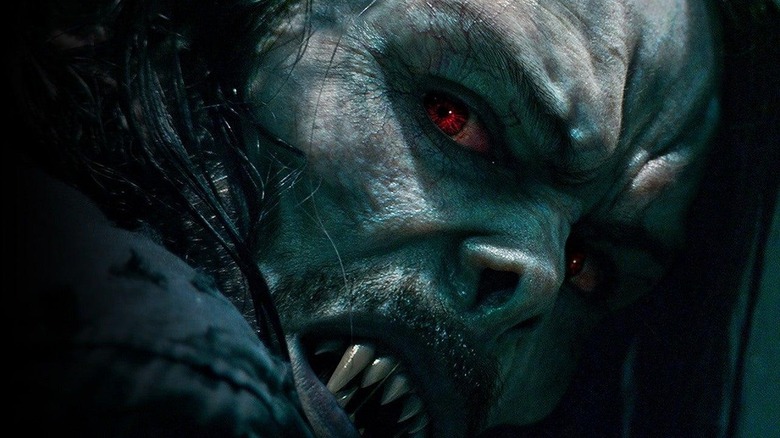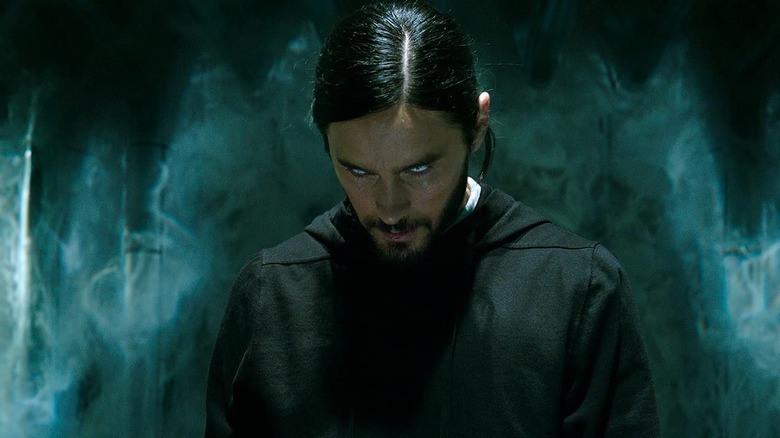Sony Claims Marvel Flop Morbius Actually Turned A Profit — Is That Possible?
We may receive a commission on purchases made from links.
In the aftermath of the shocking success of "Venom" in 2018, Sony realized that the "Spider-Man" franchise could be even more fruitful than it had been. The multi-billion-dollar Marvel Comics property is, much like "Batman," an expansive world with hundreds, if not thousands of characters. And we're not even talking about the likes of The Avengers. Even limited to characters connected directly to Spidey, there is much to mine. In 2022, Sony tested the limits of that with "Morbius." What resulted was a meme-worthy superhero flop that is remembered best for "it's Morbin' time" jokes.
Against a $75 million budget, the delayed, troubled "Morbius" earned just $167.4 million worldwide, ranking as one of the biggest flops of 2022. It was also trashed by critics and caused Sony to hit the pause button on many similar planned spin-offs centered on secondary "Spider-Man" characters, such as Black Cat, Silver Sable, Nightwatch, and more. Several others still made it out into the world, including this year's even bigger flop "Madame Web" and, more recently, "Kraven the Hunter."
Without getting too off-topic, "Kraven the Hunter" is off to an even worse start at the box office against a much bigger budget. Sony has to rethink its strategy going forward and, frankly, it's a little tough to wonder why both "Madame Web" and "Kraven" happened the way they happened after "Morbius." Well, there might be an explanation for that. According to Sony at least, "Morbius" ended up turning a profit. This, per a report from Variety digging into the studio's future plans with the "Spider-Man" franchise in the aftermath of "Kraven" taking a nosedive.
The report says the Sony brass does "insist" that "Morbius" turned a profit. That's enough to make one raise an eyebrow but it's worth asking the question, might that be possible? Let's take a harder look at the numbers and see what we can find out.
Morbius may well have turned a profit beyond the box office
First and foremost, there is zero — and I do mean zero — chance that director Daniel Espinosa's "Morbius" turned a profit purely from its theatrical run alone. Even if we're to assume that Sony was remarkably thrifty with the marketing, a $75 million budget coupled with a $50 million marketing spend would put the total investment at $125 million. Again, that's a conservative number. The rule of thumb is that theaters keep roughly half the money from ticket sales, meaning Sony would have received $84 million, give or take from the film's box office take.
What that leaves us with (conservatively) is at least a $40 million shortfall that would need to be accounted for before this film could be considered profitable. What we have to do is then look at other areas, known as ancillary revenue streams, that could account for that money. This includes VOD rentals/purchases, merchandise, cable rights, foreign sales, and Blu-ray/DVD sales. For what it's worth, "Morbius" did top the physical sales charts in its first week of release, per Blu-ray.com.
Sony doesn't release full sales figures for Blu-ray or DVDs, but you can pick "Morbius" up on 4K for $15 on Amazon right now! A bargain at any price, surely. Sony also doesn't release any hard VOD numbers. That said, Universal Pictures has made a fortune from VOD since the pandemic began. We're talking billions of dollars. It's become a very good supplemental part of the business. There's also the deal that Sony has with Netflix for its films since Sony doesn't have its own streaming service.
Speaking to that deal, "Madame Web" ended up topping the charts on Netflix earlier this year after barely making $100 million worldwide on an $80 million budget. "Morbius," similarly, found an audience on the streaming service. So, when we take all of this into account, is it conceivable that the money the film lost during its theatrical run was made up for by ancillary revenue? Yes, it is.
Now, there is something to be said for Sony maybe learning the wrong lessons from that, but there's also something to be said for keeping budgets low. Even a flop made for the right price can eventually make its money back. "Kraven," on the other hand, has a steep uphill battle ahead. If nothing else, it's fascinating to consider given this movie's lousy reputation.

